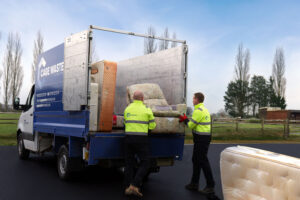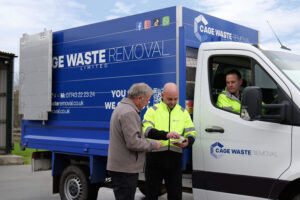Textile Recycling
Textile recycling is the process of reusing or repurposing worn or unwanted clothing, fabrics, and textiles to create new products. It helps reduce the environmental impact of textile waste, conserves resources, and contributes to a more sustainable circular economy. The textile industry is one of the largest polluters globally, and recycling textiles is a key step in mitigating its environmental impact.
Why Is Textile Recycling Important?
- Waste Reduction: The global textile industry produces millions of tons of waste each year. A significant portion of this waste ends up in landfills, where it takes years, if not centuries, to decompose. Recycling textiles reduces this waste and helps divert it from landfills.
- Resource Conservation: Textiles, especially those made from synthetic fibers like polyester, require significant resources to produce, including water, energy, and raw materials. Recycling reduces the need for new raw materials, thereby conserving these resources.
- Environmental Impact: The production and disposal of textiles contribute to air and water pollution. By recycling, the carbon footprint of textile manufacturing is reduced, as fewer resources are needed, and harmful emissions are minimized.
- Reduction of Fast Fashion: Recycling textiles encourages consumers to recycle their clothing instead of constantly purchasing new items, which is a fundamental part of the fast fashion industry. This shift can help reduce the demand for new textiles and promote sustainable fashion practices.
Types of Textile Recycling
There are two main types of textile recycling:
- Mechanical Recycling: This method involves physically processing the textiles to turn them into new materials without altering their chemical structure.
- Chemical Recycling: This involves breaking down textiles chemically to turn them back into their basic components, which can then be used to create new fabrics or fibers.
Challenges of Textile Recycling
Despite its benefits, textile recycling faces several challenges:
- Complexity of Materials: Many textiles are made from a mix of fibers (such as cotton and polyester), which are difficult to separate and recycle effectively. This can limit the types of textiles that can be recycled.
- Contamination: Textiles may be contaminated with chemicals (e.g., dyes, pesticides, or flame retardants) that make them unsuitable for recycling. Proper cleaning is necessary but may be costly and energy-intensive.
What Can Be Recycled?
Many types of textiles can be recycled, including:
- Clothing: Worn-out clothes, including jackets, jeans, t-shirts, and sweaters. Home Textiles: Old bed linens, towels, curtains, and blankets. Industrial Textiles: Fabric scraps from manufacturing, as well as used carpets and upholstery.
- Post-Consumer Waste: Clothes and textiles discarded by consumers, including garments that cannot be resold (e.g., damaged or outdated clothes).
What Happens to Recycled Textiles?
Recycled textiles can be repurposed in several ways:
- New Clothing: Recycled fibers, especially from chemical recycling, can be used to make new garments. Some brands already use recycled polyester or cotton from old clothing in their production. Home and Commercial
- Products: Textiles can be made into products like insulation, upholstery fabric, blankets, or even cleaning rags.
- Filler Materials: Recycled textiles are often used in automotive or construction industries as padding, soundproofing, or insulation materials.
Textile recycling is a key practice in reducing the environmental impact of the textile industry, conserving natural resources, and supporting a more sustainable, circular economy. While challenges remain, increasing awareness and investment in recycling technologies are helping to improve the efficiency of textile recycling.
Ready to Clear Your Waste?
Don’t let waste pile up! Reach out to Cage Waste Removal for efficient and eco-friendly waste management solutions. Contact us now to schedule your same-day service and experience the difference.
Why Choose Our Services

Sustainable Practices
All collected waste is processed with a focus on recycling and reducing landfill contributions, supporting a healthier planet.

Full Traceability
Track your waste from collection to disposal, ensuring transparency and accountability in our processes.

Customized Solutions
Our services are adaptable to meet the unique needs of each client, providing personalized waste management strategies.
What Our Customers Say
★★★★★
"Cage Waste Removal exceeded my expectations with their prompt and efficient service. Their commitment to sustainability is truly commendable."
Jane Hawthorn
Local Business Owner
★★★★★
"I have been using Cage Waste Removal for over a year now, and their professionalism and reliability are unmatched. Highly recommended!"
John Smith
Homeowner
★★★★★
"The team at Cage Waste Removal is fantastic! They made the entire process hassle-free, and I love that they prioritize eco-friendly practices."
Emily Brown
Environmental Consultant
Get Your Free Quote Today!
Experience a seamless waste removal service with Cage Waste Removal. Reach out to us for a free quote or to schedule your service today, and enjoy a hassle-free experience that prioritises sustainability and efficiency. Let us take care of your waste needs while you focus on what matters most.
Clothing and Textile Recycling Services
Textile recycling is a vital part of our journey towards a sustainable future, and at Cage Waste Removal, we believe in the power of change. Every year, millions of tons of textiles end up in landfills, contributing to environmental degradation and wasting valuable resources. By embracing textile recycling, we can significantly reduce this impact while creating a circular economy that values every fibre.
So, what exactly is textile recycling? It involves the process of recovering old clothing, fabric, and other textile materials to create new products. This not only helps to divert waste from landfills, but it also conserves the energy and resources needed to produce new textiles. From clothing to upholstery, every item counts, and innovative recycling methods are constantly evolving to ensure that we can maximise the potential of our discarded textiles.
At Cage Waste Removal, we champion the idea that textiles can have a second life. When you choose to recycle your unwanted clothes, you’re not just decluttering your space; you’re contributing to a much larger movement aimed at preserving our planet. By donating or recycling, you help to reduce the demand for new materials, which means fewer resources are extracted, and less pollution is produced.
Textile Recycling for your old clothes
The process of textile recycling typically involves sorting, shredding, and processing materials into new fabrics or products. This way, items that may no longer be wearable can still find a purpose. Whether it’s turning old shirts into insulation or creating new garments from repurposed fabrics, the possibilities are endless. Additionally, through advanced technology and creative approaches, the textile recycling industry is continuously discovering new ways to reclaim and reinvent.
As individuals and businesses, we all have a role to play in promoting a zero waste future. Simple actions such as donating unwanted clothes to local charities, participating in clothing swaps, or taking advantage of recycling initiatives can make a significant difference. It’s not just about the act of recycling; it’s about shifting our mindset towards sustainability and recognising the value in every piece of fabric.
Join us at Cage Waste Removal in our mission to reduce textile waste and create a more sustainable world. Together, we can sew the seeds of change, transforming the way we think about clothing and its lifecycle. Let’s work hand in hand towards a future where waste is minimised, resources are cherished, and every textile has the opportunity to shine once more. Embrace textile recycling today and be part of the solution for tomorrow.
